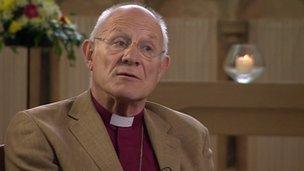How do you appoint the new bishop of Bath and Wells?
- Published

The former Bishop of Bath and Wells also had a seat in the House of Lords
Earlier this year, the search began for a new Bishop of Bath and Wells.
The post was held by the Right Reverend Peter Price who served for nearly 11 years and announced his retirement last November.
He formally stepped down after a farewell service at the end of June.
Here some more light is shed on how the appointments process works.
What level of experience is needed?
Nothing is set in stone, but the general consensus is candidates would be expected to have been ordained for a certain number of years and already hold a senior role within the clergy.
Archdeacon of Bath, the Venerable Andy Piggott, said: "It would be virtually unheard of for somebody to become a diocesan bishop without having served for some considerable time in some fairly senior job in the light of the church.
"Having said that the Bishop of Salisbury was appointed a couple of years ago and he came from being a vicar to a diocesan bishop but he had served in parishes for a considerable period and was vicar in one of the most famous parish churches in the Church of England - St Martin in the Fields in London.
"So normally if you're to be a diocesan bishop - you might well have been the dean of a cathedral or an archdeacon or probably most likely already be a suffragan bishop."
A suffragan bishop works as an assistant to the diocesan bishop and is effectively his deputy. This role is sometimes called a junior bishop.
Who decides on the appointment?
A number of people are involved including the Queen who formally appoints the new bishop.
In January, the Vacancy in See Committee met to agree a 'person spec' or Statement of Need , externalfor the job. This group is made up of 25 people who represent both clergy and laity (non-ordained people).
They also select six people from within the committee to serve on the Crown Nominations Commission (CNC).
Another six are elected onto the CNC from across the country and they meet under the Archbishop of Canterbury who is the chair.
Dean of Wells, the Very Reverend John Clarke, said: "One of the things that is interesting is that it's the first appointment the new Archbishop of Canterbury Justin Welby will be chairing and he may have some ideas about who he'd like to see as a bishop."
It is this commission which will eventually make a recommendation to the Queen who approves and ratifies the decision.
How much interest is there in the role?
The appointments process is confidential but the public is invited to suggest names to appointments secretaries who feed into the process.
"I think some of them may be suffragan bishops - what you call junior bishops.
"There might be people who come and do substantial jobs, perhaps in training for the church, or running cathedrals - there are all kinds of ways that people can come into it.
"There's probably a field of about 25 names suggested," added Mr Clarke.
What qualities does a new bishop need to have?
At the beginning of July, a Statement of Needs was published by the committee.
"It is quite complicated - because you have to take into account what people in Somerset look for in a bishop, what are the tasks facing the church in Somerset, what are the national needs of a bishop because a bishop is for the whole country and not just Somerset," added Mr Clarke.
What are the chances of having a woman bishop?
The legislation is not in place for a woman bishop so this is not a possibility at the moment.
However, women bishops have been supported strongly by the former bishop and senior clergy within the Bath and Wells diocese.
There is also overall support for women bishops in the Church of England and the issue is set to be debated again in the July 2013 synod meeting.
How long will the process take?
A name could be announced before Christmas, although it is not likely he will formally take up the role until next spring.
The commission is due to meet again on 18 July, where a shortlist is drawn up, and a second meeting, is planned in October to interview candidates.